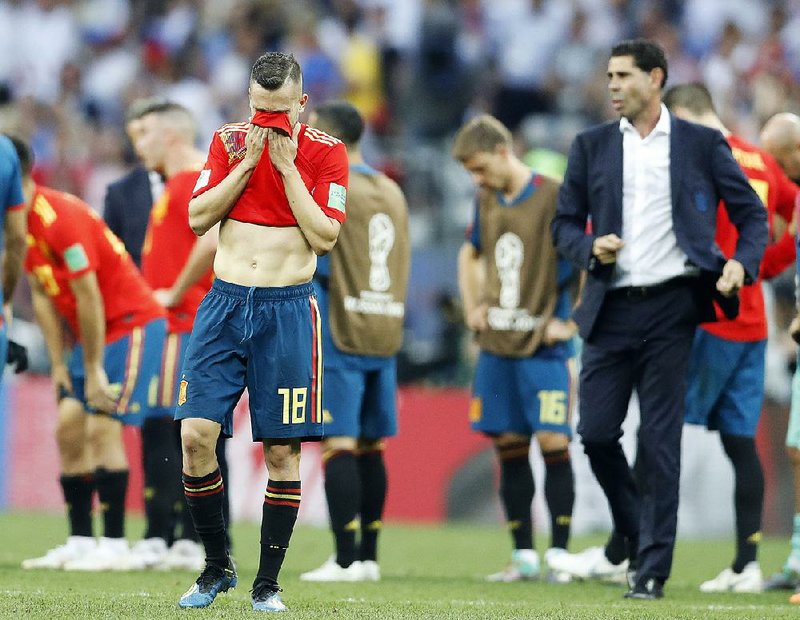SOCHI, Russia -- Well, Spain can enjoy its break from World Cup competition now.
There will be plenty of time for the Spaniards to figure out how to start regrouping following yet another early elimination at a major tournament.
And there will be plenty of blame to spread around in their spare time, too, following one of the national team's worst World Cup debacles.
The journey that started with an embarrassing coaching change before the tournament ended with the downfall of the "tiki-taka" style that was crucial to La Roja's triumph not too long ago. Mighty Spain couldn't get past Russia in the round of 16 on Sunday, being eliminated by the World Cup's lowest ranked team in a penalty shootout .
It didn't take long before the finger-pointing started, and there were plenty of targets: the newly elected federation president, the inexperienced new coach, the struggling goalkeeper, the aging members of the golden generation.
Even the team's commitment was questioned after Jorge "Koke" Resurreccion, who missed one of the penalties in the shootout, had said players didn't watch many of the World Cup games in part because they interfered with the siesta, Spain's traditional nap time.
The team looked somnolent as ever in Moscow against the 70th-ranked host, unable to break through Russia's defense and letting it all play out in a shootout following a 1-1 draw in regulation and extra time. Iago Aspas also missed a penalty and Russia prevailed 4-3.
It was Spain's third consecutive early elimination following disappointments at the 2014 World Cup -- when it didn't make it past the group stage -- and the 2016 European Championship, when it lost to Italy in the round of 16.
La Roja had dominated soccer before that, winning two consecutive Euros and the 2010 World Cup.
It all looked good for Spain entering the tournament, with coach Julen Lopetegui leading the team on a 20-match unbeaten streak and turning La Roja into one of the main title favorites.
But chaos hit when the soccer federation's newly elected president, Luis Rubiales, fired Lopetegui for accepting a job with Real Madrid without letting officials know in advance. Fernando Hierro, a former player who was acting as the federation's sporting director, was appointed as the team's new coach two days before the opening match against Portugal.
The move sparked an unprecedented crisis for Spain, with blame being shared by Lopetegui, Real Madrid and Rubiales himself.
"I don't regret the decision," Rubiales told Spanish media after Sunday's match. "It had to be made."
It didn't help Rubiales' cause when Hierro made the controversial decision to bench Andres Iniesta -- a symbol of Spain's golden generation -- against Russia. The playmaker entered the match in the second half and helped Spain improve, but it was too late.
"As the coach I'm the one responsible for what happened," Hierro said. "The players did their best, as always."
Rubiales has another difficult decision to make now -- whether to keep Hierro or bring on another coach to continue revamping the national team. If he does make a change, will he go with the experience of a veteran or someone with fresh ideas?
Lopetegui, who had no significant experience with a major club but had won with Spain's youth squads, was proving to be the right choice for Spain until being axed before finishing his job.
"We wouldn't mind if Hierro continued," captain Sergio Ramos said.
Among the candidates rumored for the position was former Barcelona coach Luis Enrique.
Sports on 07/03/2018
